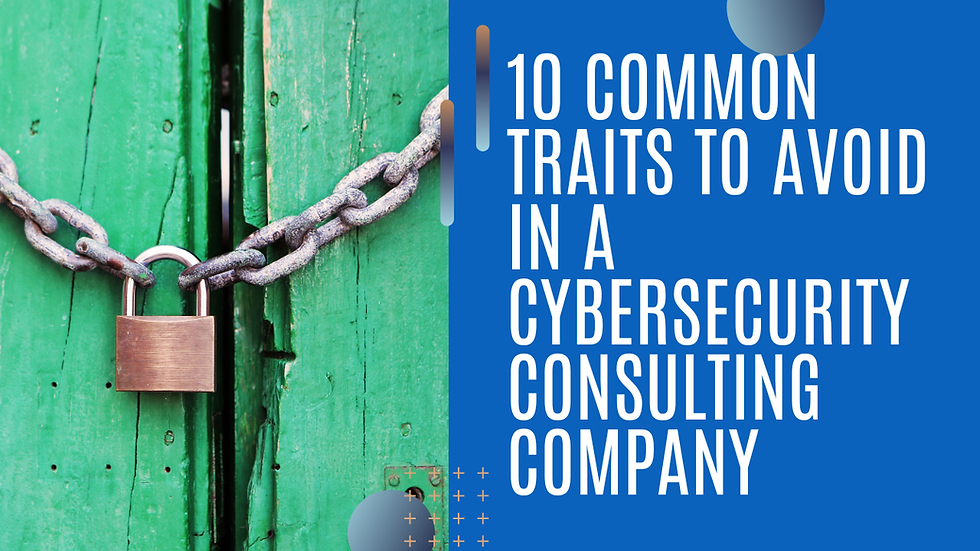
Safeguarding against cyber threats has become a top priority for businesses. Selecting the right cybersecurity consulting firm is a critical step toward ensuring the resilience of your digital infrastructure.
This blog serves as your guide, offering an extensive checklist encompassing 18 crucial factors to consider when choosing the ideal cybersecurity partner.
1. Expertise and Experience:
Begin your evaluation by understanding the consulting firm's expertise and experience:
How many years has the firm been involved in cybersecurity?
Can the firm provide examples of successful cybersecurity projects within your industry?
2. Industry-Specific Knowledge:
Tailoring cybersecurity measures to industry-specific threats is essential:
Does the firm have experience dealing with cybersecurity challenges specific to your industry?
How does the firm stay updated on industry-specific threats and compliance requirements?
3. Client References and Reputation:
Look beyond marketing claims to understand the firm's reputation and client satisfaction:
Can the firm provide references from previous clients with similar cybersecurity needs?
What is the firm's reputation in the cybersecurity community? Check online reviews and testimonials.
4. Comprehensive Services Portfolio:
Evaluate the depth and breadth of the firm's cybersecurity services:
What services does the consulting firm offer, covering risk assessments, penetration testing, managed service, incident response, compliance & privacy consulting?
Is the firm's portfolio comprehensive enough to address your organization's diverse cybersecurity needs?
5. Collaborative Approach:
Effective collaboration is the cornerstone of a successful cybersecurity partnership:
Does the consulting firm emphasize collaboration with clients?
How does the firm involve clients in decision-making and cybersecurity strategy development?
6. Transparency and Communication:
Open communication and transparency are pivotal for a successful engagement:
How transparent is the firm in its processes, pricing, and communication?
What communication channels and tools does the firm use to inform clients about their cybersecurity status?
7. Incident Response Capabilities:
The ability to respond swiftly to incidents is crucial in the cybersecurity landscape:
What is the firm's incident response capability, especially at Level 1 (incident triage)?
How quickly can the firm respond to cybersecurity incidents?
8. Access to Monitoring Tools:
Access to real-time monitoring tools empowers organizations to make informed decisions:
Does the consulting firm provide clients with direct access to monitoring tools?
How frequently can clients access and review their cybersecurity status?
9. Ownership of Logs and Data:
Maintaining control over your data is essential for security and compliance:
Can clients retain ownership of their logs and data?
How does the firm ensure the security and privacy of client data?
10. Customization and Flexibility:
Your organization is unique, and your cybersecurity strategy should reflect that uniqueness:
Is the firm's approach to cybersecurity solutions customizable to meet specific client needs?
How flexible is the firm in adapting to evolving cybersecurity requirements?
11. Service Level Agreements (SLAs):
Service Level Agreements lay the foundation for a transparent and accountable partnership:
Does the consulting firm offer customizable SLAs that align with your organization's unique requirements?
What specific metrics and Key Performance Indicators (KPIs) are included in the SLAs to ensure both parties are on the same page regarding expectations and performance?
12. Threat Intelligence Database:
A robust threat intelligence database is the cornerstone of proactive cybersecurity:
Does the consulting firm maintain an intelligence database equipped with active Indicators of Compromise (IOCs)?
How frequently is this threat intelligence database updated, ensuring your organization is shielded against the latest and emerging cyber threats?
13. Data Security and Compliance:
Data security and regulatory compliance are non-negotiable in today's cybersecurity landscape:
How does the consulting firm ensure compliance with data protection regulations specific to your industry and region?
What measures are in place to secure sensitive information, guaranteeing security and regulatory adherence?
14. Employee Expertise:
The caliber of the consulting firm's personnel directly influences the effectiveness of your cybersecurity measures:
Are the firm's employees, particularly security analysts and architects, dedicated to client projects?
What qualifications and certifications do these employees hold, validating their expertise and ensuring they bring a wealth of knowledge to your cybersecurity strategy?
15. Cost Structure:
Understanding the pricing model is essential for long-term financial planning:
Is pricing communicated and does the company offer a variety of fixed price and time & materials options to accommodate your needs?
How is the pricing structured for Security Information and Event Management (SIEM) and Endpoint Detection and Response (EDR) services?
16. Commercial Tools and Support:
The reliability and support of the tools employed are pivotal for a robust cybersecurity infrastructure:
Does the consulting firm utilize commercial tools for cybersecurity, and is there strong vendor support?
How does the firm ensure the tools' reliability, and what mechanisms are in place to provide timely support when needed?
17. Ownership of Tools:
Empowering your organization with autonomy over cybersecurity tools is a strategic advantage:
Can your organization own the cybersecurity tools implemented by the consulting firm?
To what extent does the client have control over these tools, fostering a sense of ownership and customization?
18. Deployment Model:
The deployment model determines how seamlessly the cybersecurity measures integrate into your existing infrastructure:
Where are the tools deployed – on-premises or in the cloud?
How does the chosen deployment model align with your organization's preferences and security requirements, ensuring a smooth integration into your digital ecosystem?
Conclusion:
Selecting the right cybersecurity consulting firm requires a thorough evaluation of their capabilities, experience, and approach. By considering these 18 crucial factors, organizations can ensure they partner with a firm that not only meets their immediate cybersecurity needs but also evolves alongside the ever-changing threat landscape.
Empower your organization with a strategic cybersecurity partnership that stands resilient in the face of cyber challenges.
.png)

